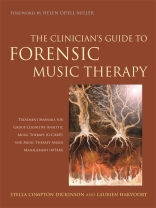The Clinician’s Guide to Forensic Music Therapy provides information and advice on how to effectively and safely deliver two context-specific, systematic approaches in forensic music therapy.
The two clinically tested treatment manuals have been specifically designed for use by music therapists and other clinicians working in prisons and secure hospital settings. They provide in-depth practical guidance for a variety of contexts and specific attention is given to risk assessment, responsivity to treatment and recovery. The book also includes advice on clinical evaluation, taking the complexities of diagnosis and patient needs into consideration.
As the very first of its kind, and written by two leading practitioners of forensic music therapy, this book is essential reading for any music therapist and student of music therapy. It will also be of interest to other clinicians working in correctional or secure psychiatric settings and includes a chapter for them on how to use music effectively.
Inhoudsopgave
Foreword by Professor Helen Odell Miller. Preface. 1. The Rationale for a Music Therapy Treatment Manual for Men and Women in Secure Forensic Treatment. 2. The Research Study Treatment Manual: User Guidelines. Appendix 2a. The Psychotherapy File. Appendix 2b. Target Problem Procedure sheet. Appendix 2c. Helpful Aspects of Therapy Questionnaire. Appendix 2d. The States Description Procedure. Appendix 2e. The Personality Structure Questionnaire. Appendix 2f. Group Diagram. Appendix 2g. The Art and Music Therapy Patient Satisfaction Questionnaire (AMT-PSQ). Appendix 2h. Patient Feedback Questionnaire. 3. Music Therapy Anger Management: A Cognitive Behavioural Music Therapy Approach. Appendix 3a. FP40 Music Therapy Coping Lists. Appendix 3b. MTAM-Handout. Appendix 3c. Music Therapy Anger Management Questionnaire. Appendix 3d. Musical Polarities. Appendix 3e. Stress Gauge Sheet. Appendix 3f. Large Stress Gauge Sheet. 4. The G-CAMT and MTAM Manualised Music Therapy Approaches in Different Forensic Psychiatric Settings. 5. Guidance and Practical Work Sheets for Music Therapists (Specialist Use). 6. Evaluating Clinical Practice. 7. Guidance for Clinicians in the Use of Music. Appendix 6a. Semi Structured Interview Schedule. Epilogue.
Over de auteur
Dr Stella Compton-Dickinson is a London-based Health and Care Profession council registered music therapist, accredited supervisor, professional oboist and lecturer, UK Council for Psychotherapy registered therapist and supervisor. She has her own private practice and twenty years’ experience in the National Health Service as a Clinician, Head of Arts Therapies and Clinical Research Lead.
Dr Laurien Hakvoort is a Dutch senior registered music therapist and Neurologic Music Therapy fellow. She is a lecturer in music therapy of Art EZ school of music and worked for 17 years in forensic psychiatry.












